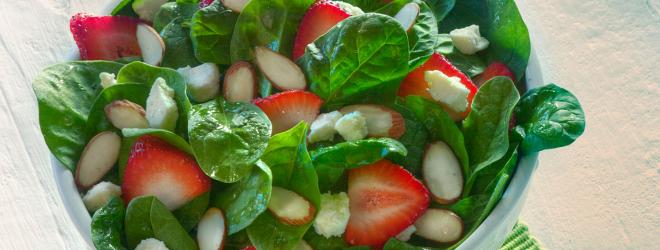A Dozen More Reasons to Eat Fruits and Veggies
1/4/2019 11:22 AM
According the Centers for Disease Control only one in 10 Americans consume enough fruits and veggies a day. So it’s important to remind people why fruit and veggies are the only food group that health experts urge us to eat more of every day. Plus we’ve included some fun and little known facts about these nutrient-packed foods to remind people why fruit and veggies are the only food group that health experts urge us to eat more of every day. Plus we’ve included some fun and little known facts about these nutrient-packed foods.
Let’s start with this: In addition to making you healthier, studies show eating a diet rich in fruits and veggies can make you more attractive. Peer reviewed research published in Plos One found that when you increase your fruit and vegetable consumption your skin develops a healthful glow with lovely shades of yellow and red that people find more attractive.
Strawberries – Always at the top of the list of kids’ favorite fruit, strawberries are high in Vitamin C, a good source of fiber, folate, potassium and antioxidants. But, did you know that eating strawberries can whiten teeth? Malic acid, a component in strawberries, acts as a natural astringent to remove surface tooth discoloration.
Studies – show mental well-being rose in accordance with the amount of fruits and vegetables consumed.
Spinach – Often characterized as a “superfood,” studies have shown that consumption of spinach has many disease-fighting characteristics. And, if your hair needs a boost, eat more spinach. Not only does the Vitamin A help create healthy scalp oils, but spinach also contains antioxidants that fight free radicals from pollution helping to strengthen and thicken hair so you experience less breakage.
Peaches and Nectarines – Juicy and delicious, these fruits contain 10 different vitamins, plus fiber and potassium. Pregnant? Not only are these nutrient-rich fruits good for your growing baby, but the abundance of potassium assists in preventing muscle cramps and keeps up energy levels.
Apples – In addition to the many disease-fighting nutrients in an apple, if you are feeling stressed or run down grab one! Red apples contain an antioxidant called quercetin, which can help boost and fortify your immune system, especially when you’re stressed out. And remember to eat the peel, which is rich in fiber and antioxidants.
Cherries – Cherries are a good source of antioxidants, which studies have indicated may reduce the risk of heart disease. Can’t sleep, suffering from jet lag? Try eating some cherries. This delicious candy-like fruit also contains melatonin, which regulates sleep cycles and may be a helpful food for fighting jet lag and insomnia.
Pears – This fruit is high in fiber, a good source for Vitamin C and contains natural antioxidants. Including pears in your diet lowers the risk of obesity, diabetes, heart disease while promoting a healthy complexion and increased energy.
Tomatoes – One of the best sources of lycopene but also good sources of potassium, Vitamin C, biotin, Vitamin K, and manganese. For sports and outdoor enthusiasts, tomatoes are also high in choline, a member of the Vitamin B family, which feeds your brain’s neurotransmitters and has been proven to improve reaction times.
Celery – While celery is 95% water, it is rich in fiber, Vitamin C and Vitamin B. And, kids love it. Adults may be interested to learn that celery gives you good breath. The veggie forces you to chew a little more – the more you chew, the more saliva you produce, which kills bacteria in your mouth that causes bad breath.
Potatoes – This very popular vegetable is a good source of Vitamin B6 and potassium, copper, Vitamin C, manganese, phosphorus, niacin plus dietary fiber. In fact, potatoes rank highest for foods with potassium, which is a mineral that is part of every cell in your body. Potassium is also vital for transmitting nerve impulses or signals and in helping muscles contract.
Bell Peppers – Peppers are rich in Vitamin A and C. The yellow, orange and red peppers are also high in beta carotene which has been shown to have cancer-fighting benefits and, like carrots, also benefit eye sight.
More Spinach and Leafy Greens – Stay smarter, longer. Peer reviewed research from Tufts University found that those who reported eating one to two daily servings of green leafy vegetables, such as kale and lettuce, had slower rates of cognitive decline.
And, the final reasons to eat more fruits and veggies – you can be happier and live longer! Peer reviewed studies show mental well-being rose in accordance with the amount of fruits and vegetables consumed. Studies also show that eating seven or more servings of fruits and veggies leads to a longer life.
There are decades of peer reviewed nutritional studies which show the many health benefits of eating a diet rich in fruits and veggies – these studies were largely conducted using conventionally grown produce. So follow the advice of health experts, purchase what produce is affordable and accessible for you and your family. Organic or conventional, just choose to eat more.



